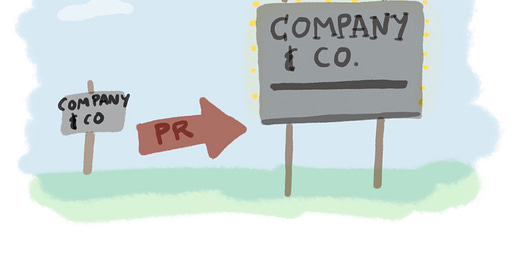PR can be a great driver of new business and help you recruit talented staff — In this episode of the Smith Sense Podcast, we discuss how to make PR work for your business.

Subscribe: — iTunes. — Stitcher. — Spotify. — Overcast. — Download.
My views on PR have changed as I’ve learned to use it strategically for my business. Antony Bruno, our director of communications at Royalty Exchange and my co-host on this podcast, taught me a lot about how to do it well.
I first invested in PR with the goal of filling our talent pipeline. I wanted people in Colorado, where we’re based, to know what a great place Royalty Exchange is to work. Over time, as we got more and more impactful coverage—in places like CNBC, Forbes, The Wall Street Journal, and The New York Times—I got a more complete picture of the power of PR when it’s done well.
PR can be a good strategy to drive new customers to your platform, product, or service. Positive news coverage can grow your pool of candidates for recruiting and boost your team’s morale. PR also has more leverage than other activities like advertising because of the compounding effect: Press begets more press.
Take a long view
PR can pay huge dividends for your company—but it takes time. This is one area of your business where you have to take a long view. You’re not going to hire a PR firm and all of a sudden get rushed onto the set of CNBC.
People often label a company an “overnight success,” even though the founder’s been working hard at it for years. It’s like that with PR: You need a focused effort over time to build up the credibility that allows you to get breakthrough stories.
If you have a finance company, your first media coverage probably isn’t going to be in the Financial Times. It’s going to be in a trade publication or blog that covers your industry. Those smaller PR wins are important because they signal to bigger outlets that you’re credible.
Know what you want to say—then listen
First, you need to know what you want to say. Then, you need to listen for opportunities to tell your story.
Distill your messages into three to five key messages that you want to communicate. In any opportunity that you have, you’ll look to deliver at least one of those. Then, listen to the outside world and try to connect things you’re hearing to those messages.
It’s important for founders to understand they’re not talking in a vacuum. The more your story connects with the things people already are talking about, the more effective your PR will be.
Many companies are understandably focused on what they’re doing in their day-to-day. You need someone who’s listening to the outside world and can figure out where your story fits in. You want to know things like where your customers “live” online and what they read. Read the publications your customers read to get a sense of what’s happening in the zeitgeist (and what your competitors are saying).
For example, I’m considering investing in a business that delivers meat to homes here in Colorado. One of the strengths of the business is that it uses a very simple supply chain because the meat is grown locally. That’s a strong story for the moment because news organizations are devoting a lot of coverage to the food supply chain.
Solve a reporter’s problem
You have to earn the right to be covered in the press, which means solving a problem for a reporter. The reporter’s problem is that they need a story that’s useful and interesting to their readers.
Know what beat a reporter covers and what type of stories interest them. You’re in a much stronger position if you can articulate why you think your story would be of interest to a reporter’s readers, based on your knowledge of their past work. That’s a better approach than blindly sending things out and hoping someone takes interest.
Chum the waters. Send updates on what you’re doing on a regular basis. A reporter may take the information you give them and find a reason to include it in a story months later, maybe when they’ve picked up on a broader trend that your story falls into.
Small hits can lead to homeruns
Coverage in smaller, more niche outlets can be valuable on its own. At Royalty Exchange we have a catalog up for auction for a popular metal band Slipknot. Mainstream media outlets aren’t interested in this, but niche music sites that Slipknot fans follow have picked it up. We got quite a bit of coverage out of it that led to a spike in new users..
Also, articles in niche publications also get picked up by larger publications, so a PR hit can turn into a homerun.
Are PR firms worth it?
Like anything else, before you hire a PR firm you want to define your goals. Make it very simple: “I want to accomplish A, B, and C.” When you interview PR firms, share those goals and have them recommend a tactical plan to achieve them.
A lot of PR firms tout the relationships they have with reporters. The important thing is that the firm knows which outlets cover your space and has the channels to reach them.
For smaller tech firms, a large all-service firm may not be the right fit. Consider finding a boutique firm that specializes in your industry vertical. An idea of Antony’s that I like: If you have a relationship with a reporter who covers your industry, ask them for a recommendation based on their interactions with different firms.
When you hire a firm, your success will depend a lot on the direction you provide to them and how well you manage the firm. Provide an overarching strategy—and then hold them accountable.














Share this post